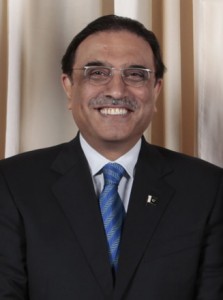Ahsan Procures Adjournment to Feb. 1 in Gilani Contempt Case; Pasha Term to Expire; NATO Routes to Re-open?
In his much-anticipated appearance today before Pakistan’s Supreme Court, Prime Minister Yousuf Raza Gilani was represented by Barrister Aitzaz Ahsan. [I must admit to a bit of bias here. Ahsan became something of a personal hero to me when he organized Pakistan’s Black Flag Week in March of 2008, eventually resulting in thousands of lawyers taking to the street and successfully securing the release and reinstatement of the Supreme Court Chief Justice who had been sacked and arrested by Pervez Musharraf. The picture at left is a screengrab from this YouTube of an appeal he sent out in organizing Black Flag Week.] The proceeding against Gilani was adjourned until February 1, in order for Aitzaz to prepare his case more fully. It also appears that Gilani has been excused from further personal appearances at the court.
In other Pakistan developments today, it appears that Ahmed Shuja Pasha will not have his term extended again as head of Pakistan’s ISI spy agency. The selection of a new ISI head will provide yet another front of intrigue in the ongoing struggles between the Zardari government and Pakistan’s military and intelligence forces. Also, it appears that Pakistan is getting close to re-opening NATO’s supply routes through the country, but with the addition of tolls.
Here is Dawn on the court proceedings:
The Supreme Court on Thursday adjourned the prime minister’s contempt hearing to Feb 1, leaving a brewing political crisis over corruption cases and presidential immunity unresolved.
The court has also exempted the premier from appearing for the upcoming hearing of the case.
Prime Minister Yousuf Raza Gilani appeared in the court today to explain why he should not be charged with contempt for failing to re-open old corruption cases against President Asif Ali Zardari.
/snip/
Ahsan requested the court for a month’s time to file a response. He said the time was required to access and go through the case’s record. Responding to which, Justice Nasir-ul-Mulk said that access to records could be provided in two days’ time.
The Express Tribune has more on the issue of why Gilani did not write a letter to Swiss authorities, asking them to re-open their prosecution of Pakistani President Asif Ali Zardari: Read more →



